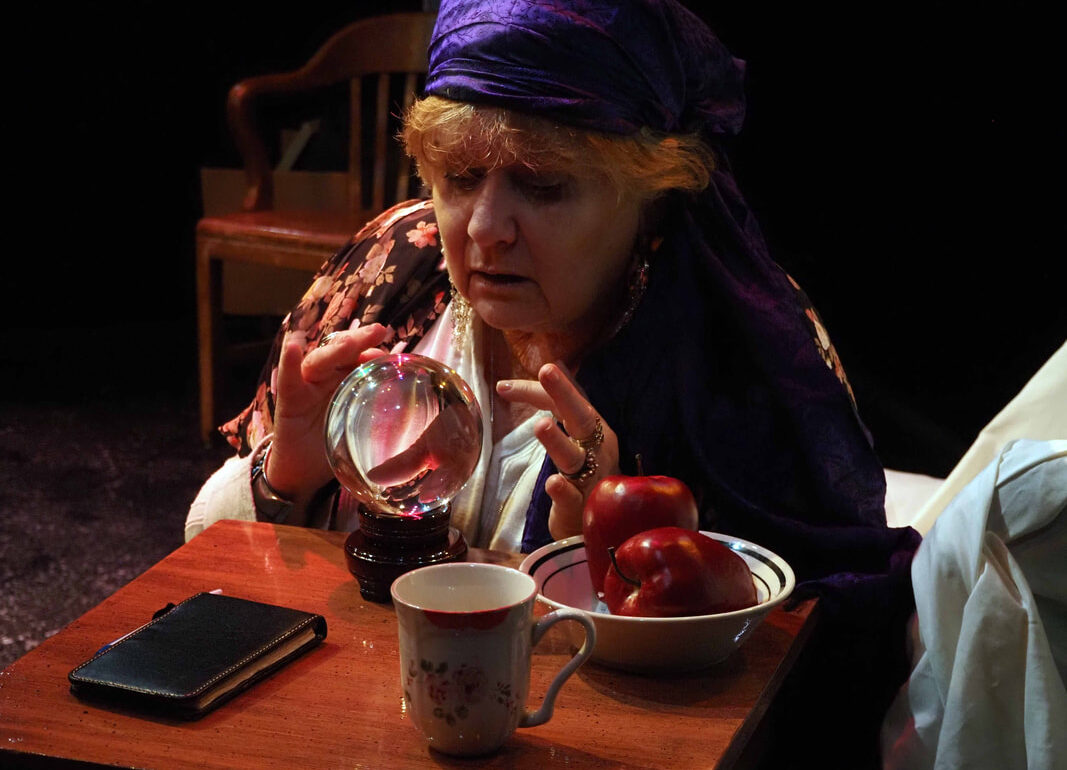Everything that happens to you is your story. How you choose to tell it? And who you let tell it? That’s up to you. A surprising drama with heart and emotional heft, Suzan Zeder’s Do Not Go Gentle is a rarely produced play— at least in these parts— and is currently making its way onto the stage at Spotlighters Theatre. An estranged son? A moody granddaughter? A spastically over-the-top estate agent? And a ghost. It almost sounds like the making of a high-comedy. And while the production is not without its humors, it runs much deeper than that and plays more toward the unique experience that is grief and loss when it comes to a death in the family. Directed by Alanna Kiewe, the production has some strong moments that really make you consider your own narrative in your own life.
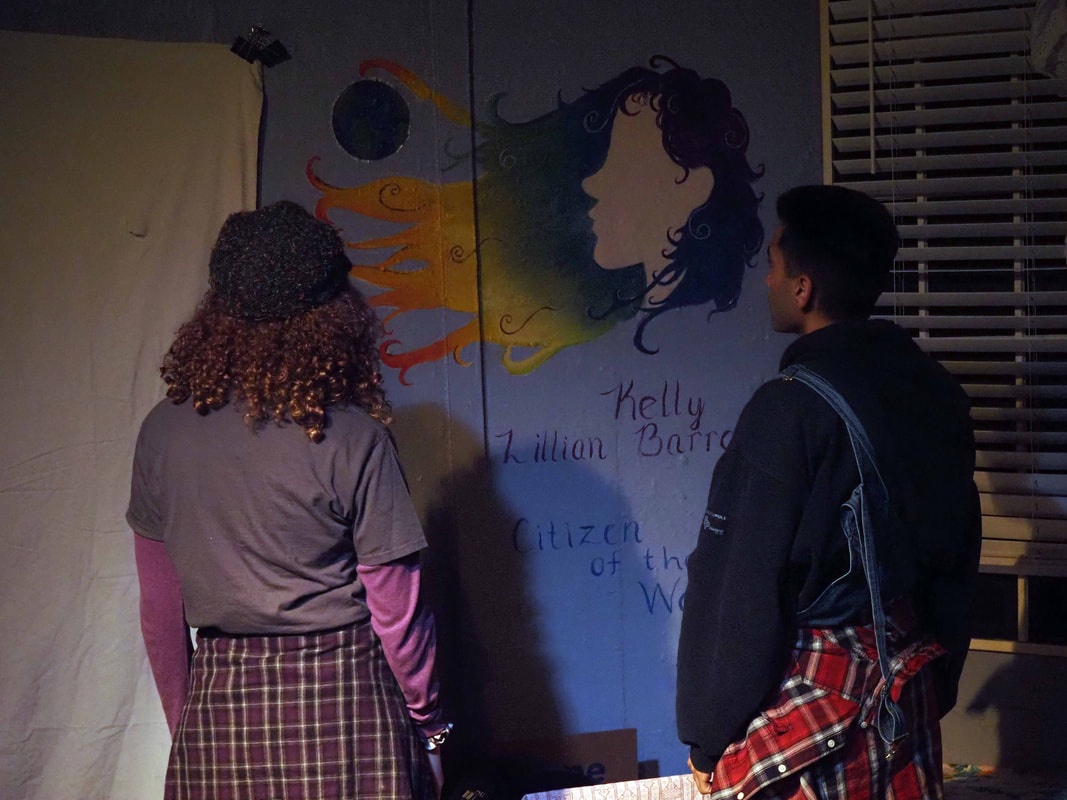
They production itself has a couple of minor bumps and bruises that keep it from living up to its fullest, smoothest potential; chalk it up to opening night nerves or perhaps still figuring out how to finesse the unique space and antique instrumentation of theatrical elements in the cozy Spotlighters’ stage, which is a theatre in the— square. The show’s biggest overall downfall is the vocal levels of the actors. Five out of six of the performers struggle with their volume and projection throughout the performance, often trailing off at the end of sentences, leaving the audience wondering how that thought or statement concluded. Half of the cast falls into the trap of ‘screen acting’, particularly the actor playing Lillian, wherein a whispered moment is truly whispered or a soft-spoken moment is delivered very quietly. As the venue is not equipped to have drop mics catching sound this becomes problematic throughout the performance, which is a shame as what these characters are saying is quite striking. And at times, the young actress playing Kelly is firing off her line at such speed with such enthusiasm that her text gets lost in a jumble of warp-speed wording. Some of the dialogue delivery needs tightening as well; there feel like there are too many pauses between one actor delivering a line (in a scene that is obviously shared as a dialogue with another actor) and another actor responding.
Audio Designer Kai DonDero has the right idea, albeit somewhat of an inconsistent execution, with the curious string-pluck sound effects utilized frequently throughout the performance. DonDero appears to craft them into the work as a way to trigger a living memory— the play takes place after the character of Lillian has died (and it is divulged within the top five minutes of the script that the character is not only dead, but a trapped ghost wandering through the scenes)— every time a flashback occurs to when Lillian was living we get this series of string-plucks, maybe a guitar or a cello, however the execution isn’t always timed accordingly. Sometimes it comes a beat too early or a few beats too late. The timing with these audio bytes does seem to tighten in the second act, however. Lighting Designer Miranda Schad somewhat misses the mark, washing out the vibrant purple in the Kelly character’s hair (which becomes a minor focal-plot point) and while the house is made aware that the lighting grid (older than at least two of the performers on stage) is being hopefully replaced over the summer, the missed opportunities for effects on the ‘reveals’ at the end of the show is slightly disappointing.
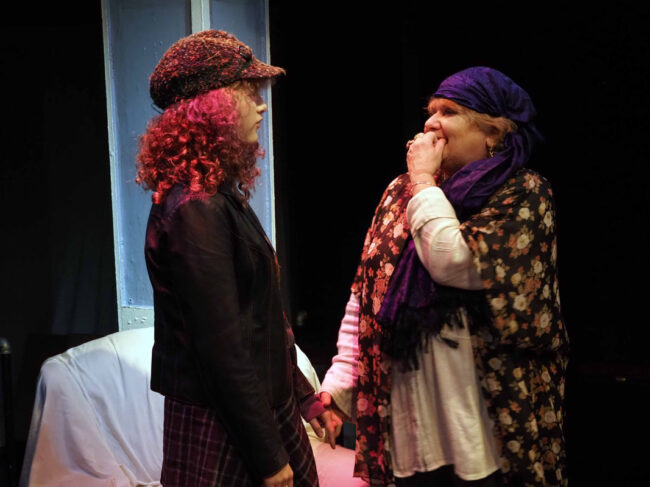
But for all of those missteps and hiccups there are some really impressive components to the performance. Scenic Artist Alan Zemla and Andrea Unger’s ‘mural’ works are part of those impressive intricacies. While the script dictates that you don’t get to see these visual wonders until the end— the paintings that literally scatter large portions of the walls are truly remarkable and really showcase Zemla and Unger’s artistic capabilities. The set is otherwise ordinary— an internal house, spaced out with well-practiced ease by Zemla’s seasoned hand.
If you’re hoping for some scene-stealing, comedic relief, you’ll definitely get it from the wacky estate sales agent, Mildred Flumac (Emma Hawthorn). There’s an over-the-topness that just adds some much-needed levity to the situation. Perhaps it the notion that the estate agent is more intent on getting the house prepared for the sale than anyone actually related to the deceased, or maybe it’s just Hawthorn’s hilarious spatial relationship to the house— bustling about it as if it were her own and not a commission project. Hawthorn has a good sense of comedic timing, appearing at haphazardly humorous moments and being both vocally and physically adamant that what she’s pushing is the best approach to the overall situation.
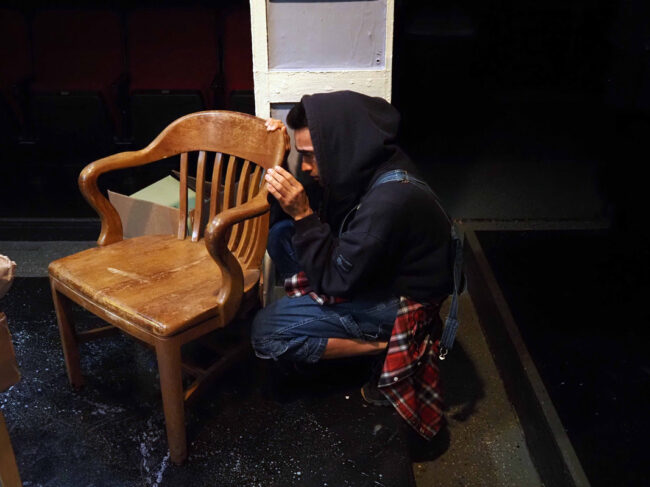
The most stunning dramatic performance in the production comes from Gurtejan Swaich in the role of ‘Nobody.’ Both Swaich’s interactions with the family once he’s discovered and in memory with Lillian are superb. You get the keen sense of a naïve, undereducated, and very fearful young boy; Swaich masters this role in a fascinating fashion that really keeps you invested in his character’s story. The ‘learning to howl’ scene is as hilarious and cathartic as his moments learning to read are reverent and powerful. Everyone has a story in this overall story of Do Not Go Gentle but you’ll find yourself drawn to ‘Nobody’s’ story perhaps more intensely than any of the others.
Playing the moody yet perky, totally temperamental teenage granddaughter Kelly is young actress Sam Klarner. (If Klarner can just slow her speech in places, which is a learning curve of the stage, especially when one possesses as much enthusiasm and passion as Klarner appears to possess, she’ll go places.) The moodiness of a teenager who doesn’t have the intellectual fortitude to rationalize the reasons behind her feelings is portrayed brilliantly by Klarner and she’s physically invested in the character’s motions and emotions. When she’s sitting in the chair, which she then learns is the chair where grammy died, the way she springs out of it as if she’s been electrocuted is hilarious. Emotional expression comes easily to Klarner and she delivers several really expressive moments— particularly in the confrontation with her grandmother during one of the living memories.
The story gets knotted up around the estranged son Windsor (Kingston Bowen) and his cousin Joanna (Shannon Willing) being there to sort out the aftermath of Lillian (Hillary Mazer)’s death. Director Alanna Kiewe makes extraordinary use of the space at the beginning of the show— placing Bowen, Willing, and Klarner in separate corners of the house, with Mazer on stage, (and this is an excellent example of when Miranda Schad’s lighting design is effective)— lighting them up as they quickly fire through their snippets of text about learning of Lillian’s death… including Lillian, whose text is completely humor driven. Bowen’s character is a high-ranking military officer though we never quite get the stiff and strict rigidity one might expect from such a character. He is, however, very closed off, which services the character’s emotional shortcomings well.
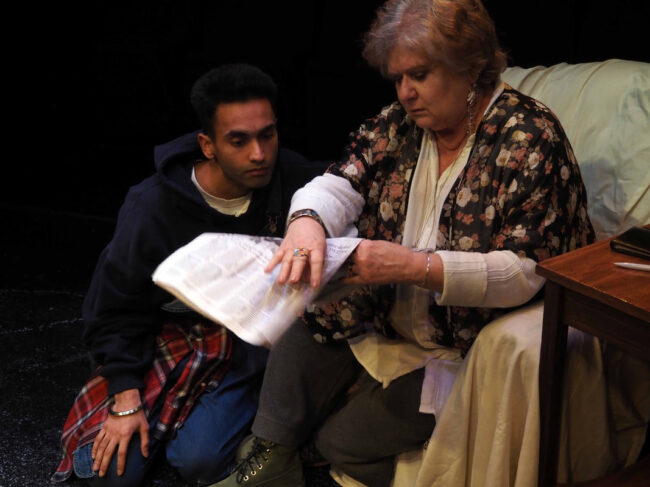
Mazer, as the focal character of Lillian Barron, gives somewhat of a mixed performance, though most of it errs on the side of being enjoyable. (Again with the constant vocal trail-off, whispering, and other lack of volume in moments which aren’t designed to be shouted, it’s very hard to hear everything she says.) When Mazer is in her element, she radiates like a quirky oddball beaming a glittery burst of colors all over the place. Watching her with the crystal ball in a living memory with Joanna (Shannon Willing) provides great entertainment. Watching the emotional struggle she invests in the argument with Klarner’s Kelly is equal parts haunting and tragic. Mazer has a good handle on some of her more comedic moments, particularly when they’re quippy one-liners delivered as a ghost, echoing before or after words spoken by her living relatives. She’s also possessed of an undeniable zest, something akin to a universal rage that doesn’t always take the face of rage but still possesses that undercurrent of rage in its energy. It’s hard to describe but you feel it in most of her scenes and it’s fascinating to watch.
It’s ultimately an impressive script and there’s quite a bit of humor laced throughout. Reconciliation, forgiveness, accepting, and understanding— these are all critical components to anyone’s story and Do Not Go Gentle brings that to the forefront of the mind in hopes that the audience will take that with them when they go and remember those factors when it comes to living and remembering their own stories.
Running Time: Approximately 2 hours with one intermission
Do Not Go Gentle plays through March 19, 2023 at The Audrey Herman Spotlighters Theatre— 817 Saint Paul Street, Baltimore MD. For tickets call the box office at (410) 752-1225 or purchase them online.

